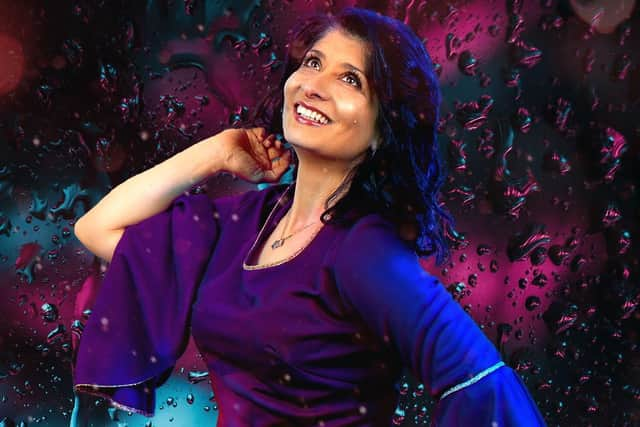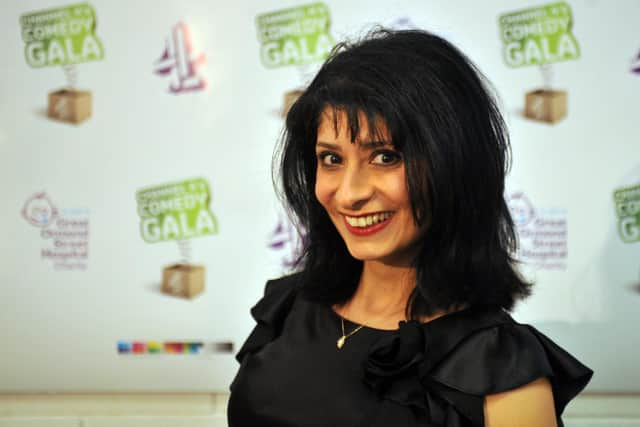Shaparak Khorsandi on Sheffield’s Jarvis Cocker, drinking in the 90s, self-care and young comedians
If a comedian had used meditation to unwind after a gig in the 1990s, says Shaparak Khorsandi, everyone would have thought that they had joined a cult.
But while sat with a group of contemporary female performers the discussion was all about which apps they use to “come down” after shows. The emergence of such “self care”, and a dissection of the more self-destructive ‘ladette’ culture which came before it, are themes explored in Khorsandi’s latest show It Was the 90s!
Advertisement
Hide AdAdvertisement
Hide AdKhorsandi, 48, who was in her teens and twenties during the 1990s, admits that back then she craved hedonism, having grown up with a “strict mother”, and embraced the ladette craze.


“Feminism in the 90s – for the ladettes – meant matching the boys pint for pint and there was no such thing as self-care; self-care meant having a Berocca and a morning after pill,” she says.
“I do compare it to just how differently young people look after themselves now and also in comedy how things have changed. We used to pride ourselves on being really bombastic and tough and gladiatorial. And now, younger comics are much more gentle and much more inclusive.”
She says the 90s was the decade where “you didn’t go out and have a drink in the hope that you’ll meet someone you fancy, you went out and you drank until you fancied someone”.
Advertisement
Hide AdAdvertisement
Hide AdHowever, there may have been deeper reasons the comic, who was born in Iran, threw caution to the wind. “I got diagnosed with ADHD last year and I’ve been learning all about that, and just how much binge drinking lends itself to ADHD because it is such a powerful form of self-medication and self-soothing.


“When I thought everyone was boozing, there were, of course, brilliant women in the 90s who weren’t doing that at all and weren’t a part of that. And I took the ladette culture way too far into the 2000s. It took me a long time to realise that nobody else was doing it anymore. It was just me at the Edinburgh Festival at five in the morning, still having drinks. And that’s when I realised ladette culture had finished and I was straying into alcoholism.”
She hopes not to have judged herself “too harshly” in the show – in-keeping with the self-care culture that’s recently developed.
It’s an approach Khorsandi is adopting more these days, one example being that this tour will be her last for a while. “I’m doing other things that need my concentration,” she says, explaining that she has more books in the works. She released the novels Nina Is Not Ok in 2016 and Kissing Emma last year, after bringing out a memoir in 2009.
Advertisement
Hide AdAdvertisement
Hide Ad“I’ve been doing stand-up for 20 years. I think it’s time to do one last tour show until, frankly, my children are older because it’s really hard.”
When it comes to commentary on younger people “it’s all favourable,” she says. “I think younger people now are doing it much better than we did. They do get a bit of a hammering, younger people now, from my generation, who - because we were the ravers – absolutely don’t ever think we’re old. But there’s a lot of that ‘young people these days’ going on from my generation. So it is a bit of a hats off, actually, to the way younger people are conducting themselves now I think.”
However, she has changed politically from the socialist-leaning woman of 30 years ago, describing herself as more “right-wing” now – though stresses in unpublishable terms how the current Government is “not my tribe”.
In the 1990s she was “so married to my causes”, which was then mainly gay rights. “I would go to parties and I would lay traps for someone I was talking to, just sort of casually mention what was the hot topic at the time, which was ‘Should same-sex couples have equal rights in adoption to heterosexual couples?’. If the person I was talking to even slightly hesitated, there would be drama. ‘Either you want equality or you don’t! You’re a fascist!’ All of that.”
Advertisement
Hide AdAdvertisement
Hide AdShe talks in the show about how she tries to be compassionate to younger people.
“I had a young woman on Twitter laughing at me because I had said that Catcher In The Rye was one of my favourite books, and so she laid into me about (protagonist) Holden Caulfield being a privileged, cisgender, white public school boy.
“I sort of have to look at someone like that and remember that I am much older and just because you have ammunition it doesn’t mean you should fire it,” says Khorsandi.
“And understanding that there’s elements of me in that person that I used to be at 20, and about how it’s always the people that think they are being the most compassionate, act with the least amount of compassion. How much of that is about being young and trying to make sense of the world?”
Advertisement
Hide AdAdvertisement
Hide Ad(She concedes, though, that she actually “wasn’t very nice” to the girl on Twitter that day).
It was a Yorkshireman who was key to the nascent political awakenings of Khorsandi – Sheffield’s Jarvis Cocker and Pulp’s Common People made a huge mark on her life.
Having been raised with little money, she remembers being different to people who were “pretending to be poor” at university. “There was no language to talk about this massive class difference back then. So I spoke with a posh accent deliberately, so that people wouldn’t know how poor I was. That’s changed massively. There’s no shame now that we’ve got footballers like Raheem Sterling... people being very proud of talking about coming from nothing and making something of themselves.”
When she started on the comedy circuit, people assumed she had gone to Cambridge or Oxford and she admits she wouldn’t always correct them.
Advertisement
Hide AdAdvertisement
Hide AdShe adds: “Then Jarvis Cocker came along and he just blew all that away for me – he verbalised it all – and that really put fire in my belly and really made me embrace my natural socialist leanings. Which again, without wanting to spoil the show, I have massively gone back on in quite significant ways, as an older person.”
Khorsandi has reverted to using her original name, Shaparak (rather than Shappi) as she only changed it in the first place partly because she grew up at a time when people were “made to feel ashamed of being foreign”.
She also thinks the ADHD diagnosis has improved her comedy because after addressing it she has “never felt so at home and comfortable in my own skin and on stage”.
So she is looking forward to visiting Yorkshire, a place she loves. “If I wasn’t a Londoner, I would move to Yorkshire, specifically Hebden Bridge. But maybe that is still to come – who knows?”
Shaparak Khorsandi’s It Was The 90s! will come to Halifax Square Chapel on February 4 and The Civic in Barnsley on May 20.